In the early days of e-commerce, online stores mostly sold consumer electronics and fashion. Today, the landscape is vastly different. This digital marketplace spans diverse sectors—from every day groceries to essential pharmaceuticals and stylish furniture—proving that virtually anything can be bought and sold online.
As of 2023, e-commerce has blossomed into a multi-trillion-dollar global industry.
If you’re reading this article, chances are you’re planning to launch your online store or embark on this venture. And you should know the best tools for e-commerce to help you with your journey.
The e-commerce landscape, with its promise of substantial profits, has captivated you—enticing you into one of the most vibrant business areas. But remember, profitability is contingent on leveraging the right strategies.
Whether you’re a newcomer or a seasoned business owner, e-commerce is one of the world’s largest and most dynamic sectors, continually adapting rapidly. Staying ahead in this sector means adapting your strategies promptly to seize trends and amplify your sales with the best e-commerce marketing tools.
From the get-go, you’ll face the essential task of making your website visible and irresistible.
But wait, there’s more!
Once your site is polished to perfection, the actual game begins: drawing in the crowds.
We’re talking about mastering the art of digital marketing – from crafting click-worthy PPC ads to engaging users through savvy social media strategies. However, the path is fraught with challenges, including fierce competition, ever-changing algorithms, and the need for continually fresh content that captivates your audience.
In this post, we’ll explore how to tackle the biggest challenges head-on with the most effective tools to elevate your e-commerce sales.
So, grab your coffee and continue to explore.
What Are eCommerce Tools?

Generated with ContentGo AI
The best ecommerce tools span various functions and technologies designed to optimize online retail operations, improve customer experience, and boost sales. These tools aim to streamline multiple aspects of e-commerce business operations, from setting up websites as online storefronts and managing inventory to processing payments securely, analyzing customer data, and providing excellent customer service.
Leveraging these technologies can enhance your competitive edge, improve your market reach, and ultimately drive higher sales and customer satisfaction.
Of course, you don’t need to use a tool for every function, and the choice of which technologies to leverage can vary depending on your specific business needs and stage of growth.
If you are starting, investing in a reliable website builder or e-commerce platform like Shopify or WooCommerce can provide a solid foundation for your online presence. These platforms offer user-friendly interfaces, customizable templates, and integrated features for managing inventory, processing payments, and analyzing sales data.
As your business expands, incorporating marketing and the best SEO tools for e-commerce becomes crucial for driving website traffic and extending your customer base. Platforms such as Google Analytics, Ahrefs, or SEMrush offer invaluable insights into user behavior, optimization opportunities, and the effectiveness of your marketing strategies.
Integrating tools like ContentGo AI can streamline content creation processes, enhancing your website’s visibility in search results. With our suite of tools, you can efficiently produce high-quality content and seamlessly integrate it into your Shopify store, maximizing your online presence and customer engagement.
If you’d like to explore or try it, sign up today and check out our Shopify integration.
Additionally, as you scale, implementing customer relationship management (CRM) tools such as Salesforce or HubSpot can help you manage customer interactions, track sales leads, and personalize marketing efforts. These tools enable you to build stronger customer relationships and drive repeat business.
Ultimately, the key is carefully evaluating your business needs and goals and choosing the e-commerce tools and technologies that best align with your objectives and budget. By strategically leveraging these resources, you can optimize your online retail operations, improve your customer’s shopping experience, and drive long-term success for your business.
Why are eCommerce Tools Important?

Generated with ContentGo AI
E-commerce tools are essential for modern businesses. They help streamline operations and enhance the overall effectiveness of online sales strategies. These tools simplify many aspects of running an e-commerce business, allowing companies to focus more on growth and less on the technicalities of day-to-day operations.
Best e-commerce tools integrate various functionalities through a single platform or a suite of interconnected services, helping you efficiently manage your business’s online presence.
One of the primary benefits of e-commerce tools is the automation of repetitive tasks. This includes updates to product listings, price adjustments, and order processing. Automation saves time and reduces the likelihood of human error, ensuring that the business runs smoothly and customer orders are fulfilled accurately and promptly.
Another great benefit is that the best e-commerce tools enhance the customer shopping experience. This is crucial if you want a competitive edge and provide your customers with an experience that will make them return for more. The tools will ensure a seamless, user-friendly interface that makes browsing products, comparing them, and making purchases easy for customers. This is crucial in retaining customers and encouraging repeat business, directly contributing to increased sales.
Another significant advantage is the integration of analytics. Best e-commerce tools often have built-in analytics to track and analyze customer behavior, sales trends, and website traffic. This data is invaluable as it helps businesses make informed decisions about stock management, marketing strategies, and customer service improvements.
Additionally, e-commerce tools help in scaling operations. As businesses grow, the complexity of managing inventory, processing a higher volume of orders, and maintaining customer satisfaction increases. Best e-commerce tools are designed to handle increased demand without a corresponding increase in errors or customer service issues, facilitating smooth scalability.
What Are The Best Tools To Build An eCommerce Website?
Your business needs when building a website will vary according to your niche. For example, if you’re selling high-end fashion items, aesthetics, and a visually engaging user interface might be your priority.
On the other hand, if you plan to operate a store with a vast inventory, such as electronics or auto parts, you might prefer platforms that can handle large product databases better and offer advanced features like complex search functionalities and extensive customization options.
Here are some of the best e-commerce website tools, each offering unique advantages for building an online store:
Shopify

Shopify is one of the most popular e-commerce platforms and is pretty easy to use. It offers many themes and apps and is ideal for small businesses and larger enterprises. Shopify also handles everything from hosting and security to mobile optimization. With its multi-currency and multi-language support, Shopier makes selling to a global customer base easier.
Magento (Adobe Commerce)

Magento, now known as Adobe Commerce, is an enterprise-level e-commerce platform. It’s ideal for businesses looking to create a tailored online shopping experience, especially large enterprises or rapidly growing companies. It is scalable and has extensive customization capabilities.
The platform is also open-source, offering a rich ecosystem of extensions and a large developer community. However, Magento requires significant technical expertise to set up and maintain, and its powerful features can demand regular maintenance for optimal performance.
WooCommerce
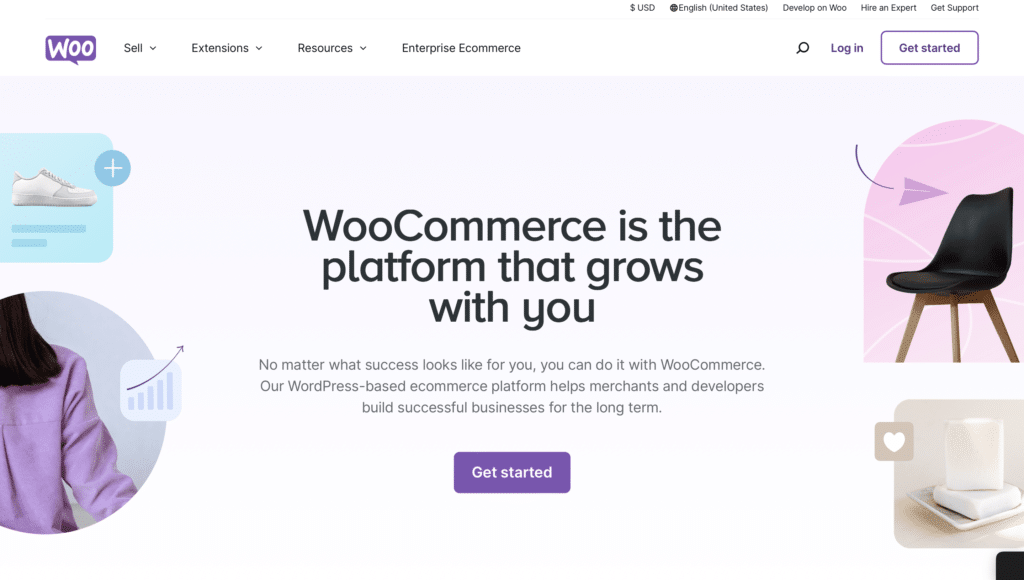
If you are already familiar with WordPress, WooCommerce is ideal for you.
It is a free and open-source e-commerce plugin that turns a WordPress site into a fully functional e-commerce store.
It’s highly customizable and suitable for businesses of all sizes, but it is particularly popular among small—and medium-sized businesses. While scalable, it may not handle extremely large operations as smoothly as some dedicated e-commerce platforms.
WooCommerce is also a practical choice for businesses emphasizing content marketing and product selling. It is one of the best ecommerce tools for WordPress. It allows you to leverage powerful blogging capabilities to engage your audience, tell your brand’s story, and boost your SEO efforts while managing a storefront.
BigCommerce

BigCommerce is an easy-to-use cloud-based e-commerce platform convenient for many businesses, from small startups to large enterprises. It has built-in features like SEO tools and multichannel selling, advanced security features, and various payment gateways without requiring third-party apps.
While BigCommerce is generally user-friendly, its advanced capabilities might need to be more convenient. The pricing model is tiered, making it cost-effective for smaller businesses while scaling up costs and features for larger enterprises.
Overall, if you’re planning to operate a store with a vast inventory or looking for a scalable and feature-rich e-commerce solution, BigCommerce is an excellent option.
Wix

Wix is a popular web development platform for its user-friendly design and drag-and-drop functionality. These features make it exceptionally easy for users to create and manage aesthetically pleasing websites without coding knowledge.
Over the years, Wix has expanded to include e-commerce capabilities, making it a suitable choice for small—to medium-sized online stores. The platform offers essential e-commerce features such as product galleries, diverse payment methods, and mobile optimization to ensure websites function seamlessly across all devices.
Additionally, Wix supports business growth with various built-in marketing tools for email campaigns, social media integration, and basic SEO functionalities to help attract and retain customers. An extensive app market further enhances its functionality, allowing users to add features like live chat and advanced analytics.
While Wix is excellent for startups and smaller businesses due to its simplicity and ease of use, it may need to be more scalable for large enterprises or match the customization depth provided by more complex platforms like Magento or WordPress with WooCommerce. Although Wix’s SEO capabilities, although improved, were once considered limited compared to other platforms, they now adequately serve most small business needs. Overall, Wix is ideal for those looking to quickly launch a straightforward, visually appealing online store without requiring deep technical skills.
Squarespace

Squarespace offers professional templates that are ideal for creatives and small businesses, focusing on aesthetics. It has several e-commerce functionalities, such as inventory management, multiple payment gateways, and integrated shipping options. Squarespace is also equipped with essential marketing and SEO tools, and all its templates are fully responsive, ensuring optimal performance on mobile devices.
While the platform is user-friendly and requires no coding skills, it offers less customization flexibility than WordPress, which could be a limitation for those with more complex website needs.
Additionally, Squarespace’s subscription model, which includes hosting, can be pricier than some basic plans of its competitors, especially for e-commerce features. Although its SEO capabilities have improved, they may still not satisfy the needs of those requiring advanced SEO options. Overall, Squarespace is best suited for businesses prioritizing high-quality design and needing a straightforward, integrated online store without extensive customization demands.
Best AI Tools For E-commerce
AI tools are crucial in e-commerce, especially if you retail vast amounts of goods. They excel at analyzing large volumes of data and automating routine tasks like customer inquiries and order processing. AI tools also significantly reduce operational costs and human error.
By integrating AI, your e-commerce business can adapt faster to market changes, such as shifts in consumer preferences, emerging trends, and varying economic conditions. Consider using the best ai tools for e-commerce to stay competitive in the rapidly evolving digital marketplace and streamline your operations.
ContentGo AI
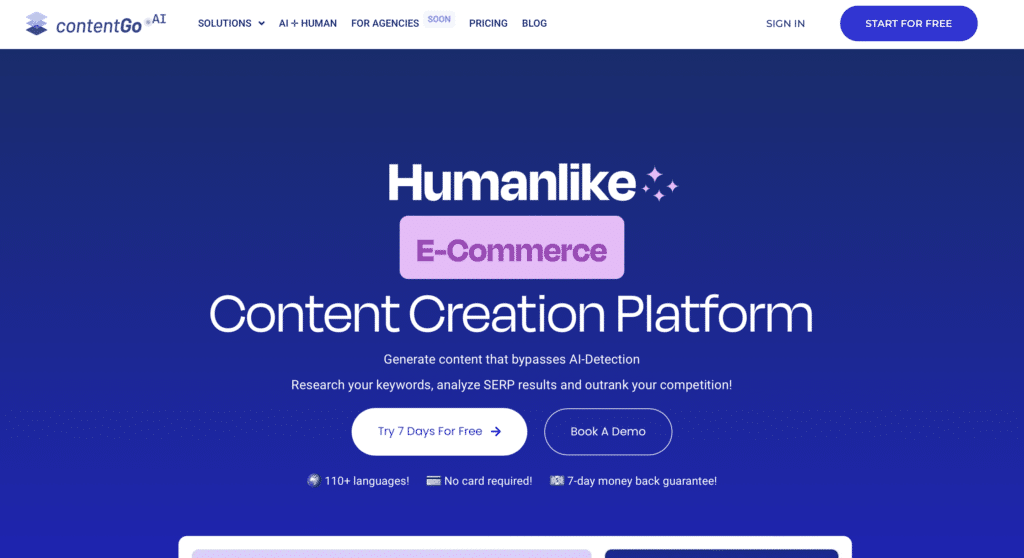
ContentGo AI leverages AI to generate engaging content that resonates with your audience. This tool can help you create compelling product descriptions, blog posts, and social media content optimized for SEO with multiple templates.
One of ContentGo AI’s best qualities that differentiates it from other AI content creation platforms is its built-in SEO compatibility tools. It combines a Keyword Wizard with SERP (Search Engine Results Page) analysis to help you choose the most relevant and popular keywords. By analyzing SERP results, you can generate content that outranks your competitors.
Also, ContentGo.AI has a super-fast and customizable bulk content feature. With a single request, you can generate multiple pieces of content, allowing you to focus on other tasks while the platform works for you. It is one of the best AI tools for e-commerce.
Klaviyo
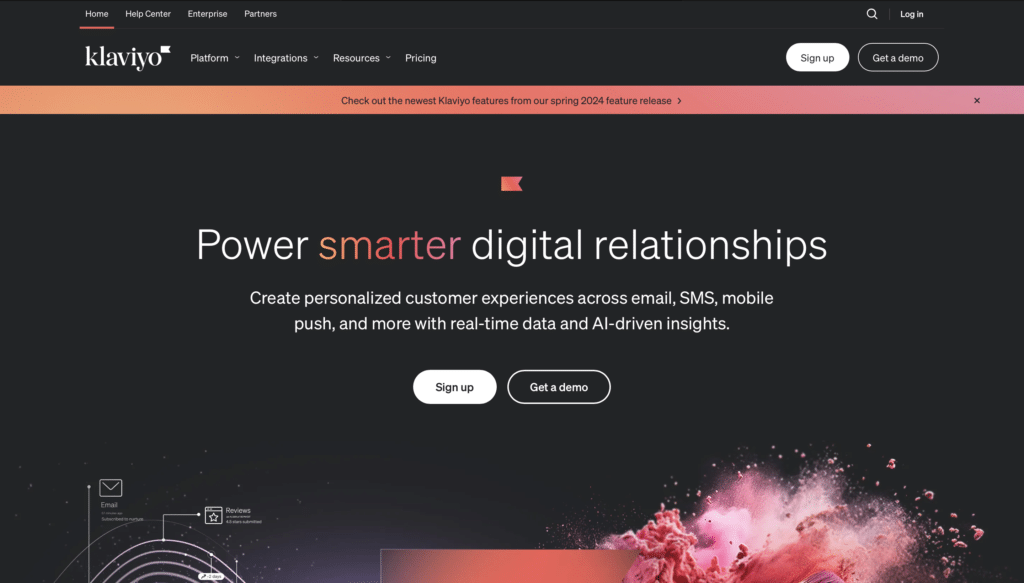
Klaviyo helps e-commerce businesses with targeted and automated email marketing tools. These AI tools segment detailed customer data and target them with advanced techniques, creating personalized emails to customers at the right time.
It is easy to use and has many integration capabilities. One of the favorite AI tools among e-commerce businesses, it’s great for increasing engagement and conversion rates through targeted email campaigns.
Dynamic Yield

Dynamic Yield leverages AI to enhance user experiences across various channels, including web, mobile apps, email, and kiosks. It uses machine learning to analyze user behavior and tailor content, recommendations and offers in real time according to individual preferences.
Dynamic Yield allows marketers to create specific user groups based on demographics, browsing habits, purchase history, and more. This multichannel personalization ensures a consistent and engaging customer experience across all touchpoints. With predictive targeting, Dynamic Yield can also forecast future behaviors, helping businesses proactively meet customer needs.
Dynamic Yield is particularly valuable for e-commerce businesses. It drives increased engagement and conversions by optimizing every step of the customer journey, from browsing to purchasing.
Yotpo

Yotpo enables businesses to efficiently collect and manage customer feedback, integrating these insights directly onto their websites to boost consumer confidence and influence purchasing decisions. One of the best features is that Yotpo encourages customers to share their experiences visually, leveraging these authentic visuals to persuade potential buyers.
Beyond managing reviews, Yotpo offers tools for creating loyalty and referral programs that incentivize repeat purchases and attract new customers through word-of-mouth. It also integrates seamlessly with social media, allowing businesses to amplify customer-generated content and extend their reach.
This integration increases brand exposure and enhances SEO, as the continuous influx of reviews and Q&A adds fresh, keyword-rich content to product pages.
Yotpo is one of the best AI tools for e-commerce businesses to convert satisfied customers into vocal brand advocates, driving sales and promoting sustainable growth.
Bluecore

Bluecore utilizes artificial intelligence to enhance personalized marketing strategies. The platform is powerful in automating targeted email campaigns and digital marketing efforts based on real-time analysis of customer behaviors and preferences. Bluecore segments audiences dynamically and forecasts future customer behaviors to improve the timing and relevance of marketing messages.
It facilitates efficient campaign management across multiple digital channels with seamless integration. Bluecore is a great tool to deliver highly personalized customer experiences, driving loyalty and sales through smart, data-driven marketing efforts.
Best eCommerce Tools for Small Businesses
Regarding small businesses, the versatility and cost-efficiency of e-commerce tools will be essential for you. As previously mentioned, platforms like Shopify, Wix, and WooCommerce offer exceptional versatility, making them ideal for small businesses that need adaptable, all-in-one solutions.
These are the best ecommerce tools for small businesses. They have inventory management, payment processing, and customer engagement functionalities. They also allow for extensive customization and scalability.
In addition to these platforms, several other outstanding tools are tailored for small e-commerce businesses. Here is our curated list:
ContentGo AI

ContentGo AI is an affordable and fast tool for new starters and small businesses. When you first start, your marketing efforts will be critical in establishing your brand and reaching potential customers. You can streamline these efforts with ContentGo AI by leveraging its capabilities to generate engaging content that resonates with your audience.
With multiple templates, you can create compelling product descriptions, blog posts, and social media content optimized for SEO, which is essential for driving organic traffic to your site.
Square Online
Square Online is ideal for small businesses that also sell in-person. This tool was developed by Square to integrate seamlessly into Square’s financial services and POS systems. With its easy-to-use customizable templates, Square Online allows businesses to set up their online presence quickly without technical skills.
It is one of the best e-commerce tools for small businesses looking to blend their online and physical sales. It features real-time inventory synchronization, ensuring consistent inventory management. Additionally, Square Online offers tools for marketing, SEO, and shipping, including local delivery and in-store pickup options.
Square Online is an excellent choice for small businesses that want to expand their online footprint while maintaining streamlined operations. Its comprehensive features and integration with Square’s broader ecosystem make it a practical and efficient solution for managing online and offline sales.
Weebly

Weebly is an excellent choice for individuals and small businesses seeking to create professional websites, blogs, and online stores without requiring coding skills. Weebly also can integrate with Square’s payment solutions to offer robust product management, inventory tracking, and secure payment processing.
The platform provides customizable website templates and basic SEO tools to help optimize content for search engines. It also offers marketing tools for email campaigns and social media integration. Weebly is an ideal solution for businesses looking to manage their presence easily across multiple channels.
Ecwid
Ecwid is a platform that enables you to easily add a fully functional online store to your existing websites, blogs, or social media platforms. Designed for small to medium-sized businesses, Ecwid stands out for its ability to integrate seamlessly with virtually any existing content management system. This easy integration solution is ideal for businesses looking to enter e-commerce without overhauling their digital presence.
Its scalability and support for international commerce make it a practical choice for growing businesses aiming to establish a versatile and comprehensive e-commerce presence.
Etsy

Etsy is an ideal online marketplace if you specialize in handmade, vintage, or unique items. Etsy provides an accessible platform for sellers to reach a broad, engaged audience that values niche products without the need to develop their website. Setting up a shop on Etsy is easy, allowing sellers to focus on their craft rather than the technical aspects of e-commerce.
Etsy supports sellers with built-in tools for shop management, marketing, and analytics, making tracking performance and optimizing sales strategies easier. Although not a traditional e-commerce builder, Etsy is a marketplace that allows small craft-oriented businesses to reach a broader audience without setting up a full-scale website, making it one of the best e-commerce tools for small businesses.
PrestaShop
PrestaShop is a free and open-source e-commerce platform that allows businesses to establish an online store with minimal investment. That’s why it is one of the best e-commerce tools for small businesses. Although some costs may be incurred for hosting and additional features, it is a cost-effective and highly customizable option.
One of PrestaShop’s best features is that it is designed to be SEO-friendly, helping businesses improve their visibility in search engine results. Its comprehensive feature set ensures that small businesses have all the necessary tools to operate a professional online store. Overall, PrestaShop is a great scalable solution ideal for small businesses looking to grow their presence in the digital marketplace without a significant initial investment.
Best SEO Tools for eCommerce
SEO is vital for e-commerce. It enhances a site’s visibility in search engine results, driving more organic traffic and increasing sales. Compared to paid advertising, SEO is cost-effective, as higher rankings can be maintained with fewer ongoing expenses. Appearing higher in search results builds trust and credibility, gives a competitive advantage, and enhances brand awareness.
An effective SEO strategy is crucial for your business. Here are the best SEO tools for e-commerce:
Yoast SEO

Yoast SEO is a unique and popular WordPress plugin that simplifies on-page SEO. It helps you optimize meta tags, generate sitemaps, and ensure that your content is SEO-friendly. One of its best features is that it offers real-time SEO analysis and feedback on content, including product descriptions and blog posts, helping ensure that all aspects of a site’s content are optimized for search engines.
Regular updates and comprehensive educational resources from Yoast ensure that e-commerce businesses can keep up with the latest SEO trends and guidelines. That’s what makes Yoast SEO one of the best SEO tools for e-commerce.
Ahrefs

Ahrefs excels in competitive analysis, providing detailed insights into competitors’ strategies, which helps businesses identify opportunities for improvement and differentiation. Ahrefs’ keyword research tools enable e-commerce sites to discover profitable keywords, optimizing their content for better search engine rankings and customer targeting.
Also, if you want to improve your backlink profile, In that case, Ahrefs will allow you to track and enhance your site’s authority by understanding and improving it. Another powerful tool that Ahrefs offers is a site audit feature that identifies and helps resolve common SEO issues, such as broken links and slow-loading pages, which can hinder a site’s performance.
Ahrefs is one of the best SEO tools for e-commerce. It provides the essential tools to refine your SEO strategy, improve site health, and increase traffic and sales.
Google Analytics

Google Analytics is an essential tool for anyone in marketing. Its vast tools enhance e-commerce SEO and offer a wealth of data. For example, by analyzing keyword performance, Google Analytics helps identify which terms drive traffic to the site, allowing for targeted content optimization.
You can get insights into user behavior, such as page visits, session duration, and navigation paths. The tool also provides critical data on bounce rates, highlighting areas where content or user engagement may need improvement to keep visitors on the site longer. If you want to make data-driven marketing decisions, Google Analytics is a must and one of the best SEO tools for e-commerce.
SEMrush
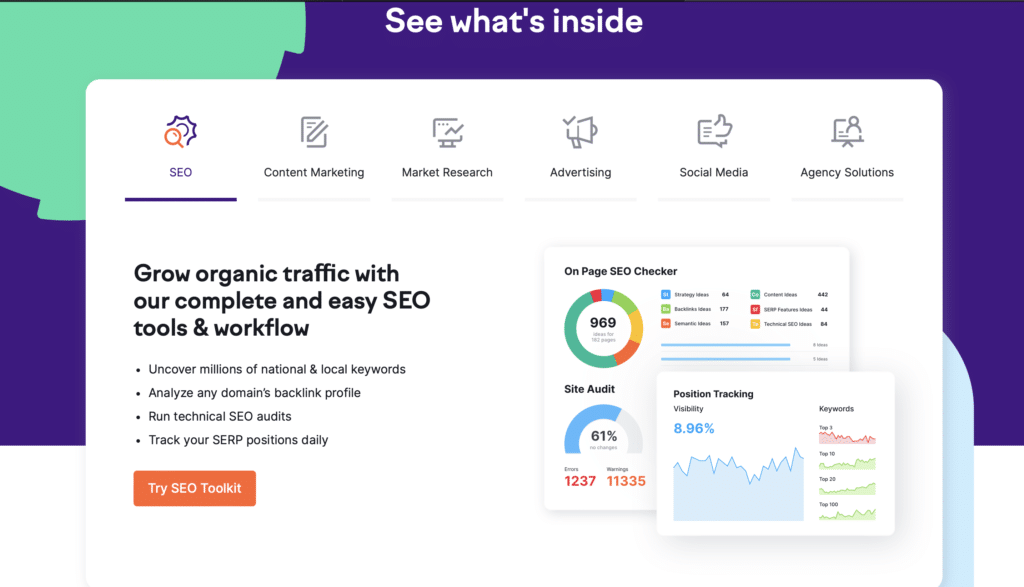
SEMrush is one of the most powerful digital marketing tools out there. Its various features can significantly increase e-commerce SEO. Some include advanced keyword research capabilities, competitor analysis, comprehensive site audits, and on-page SEO checker tools. SEMrush is also very strong in backlink analysis.
It is one of the best SEO tools for e-commerce. It is beneficial for e-commerce sites as it helps identify and capitalize on organic search opportunities.
Moz Pro
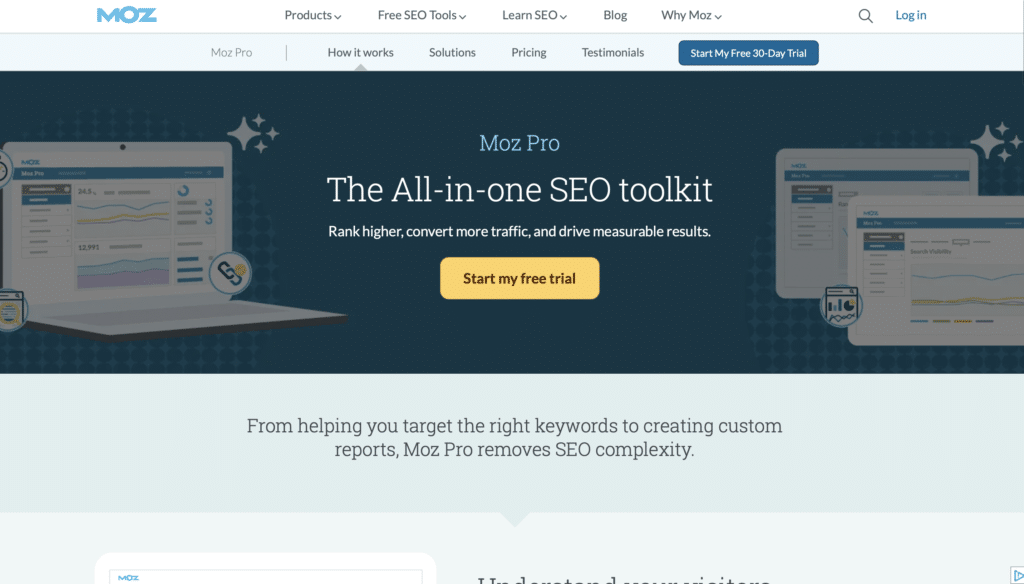
Moz Pro enhances the search engine visibility of e-commerce websites through various tools and features. It will give your business insights into targeting keywords for optimal traffic and conversions. The platform also includes a site audit feature that identifies and helps resolve common SEO issues, improving overall site health and rankings.
Moz Pro’s on-page optimization tool delivers specific recommendations to enhance individual web pages, improving their relevance and ranking potential. Customizable reporting makes tracking and communicating SEO performance easy and a valuable tool for managing and refining e-commerce SEO strategies.
ContentGo AI SERP Tool
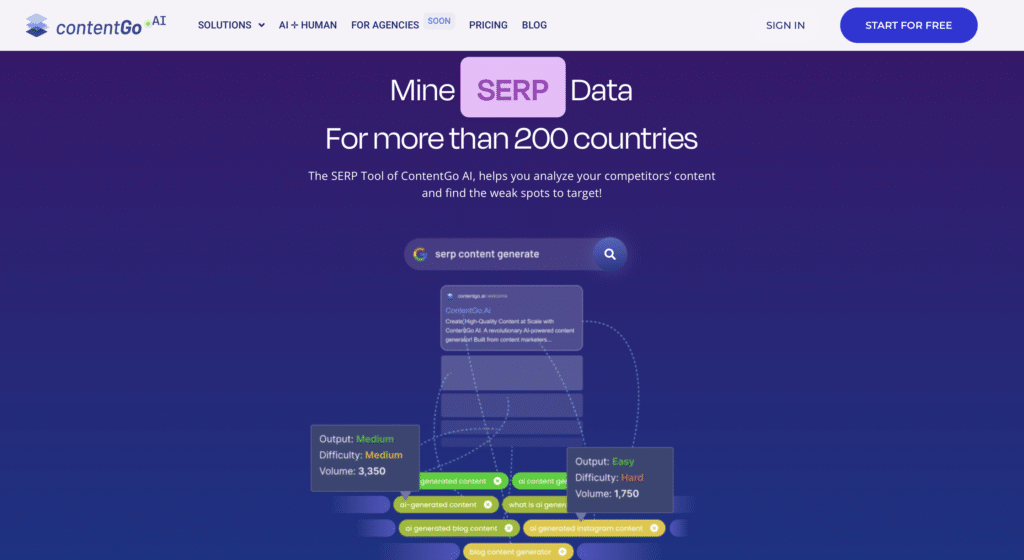
ContentGo AI‘s keyword finder and SERP (Search Engine Results Page) tools can significantly enhance the SEO performance and online visibility of e-commerce businesses while creating content. Suppose you are a new startup or a small business. In that case, your initial marketing efforts will require building a consistent, SEO-optimized content strategy. This could include creating SEO-friendly product descriptions, blog posts, and other content forms, helping businesses attract more organic traffic.
Keyword Finder tool helps e-commerce businesses identify relevant keywords that potential customers use to search for products online. By providing data on search volumes, competition levels, and related terms, a keyword finder enables businesses to discover both high-traffic and niche keywords that can be targeted to attract specific customer segments. By incorporating these keywords into product descriptions, blog posts, meta tags, and other on-page content, businesses can improve their site’s relevancy for these terms, which enhances search engine rankings and increases organic traffic.
SERP tools analyze the top search results for specific keywords, providing data on competitors’ content, such as word counts, the number of images used, Text/HTML ratio, and common keywords. With this information, e-commerce businesses can benchmark their content against top-performing competitors and identify opportunities to optimize their pages.
If you like to one-up your content game, sign up today and unlock the best all-in-one content tool for your e-commerce business!
Best eCommerce Analytics Tools
E-commerce analytics tools will help you to make data-driven decisions, allowing you to understand customer behavior, track financial performance, and refine your marketing efforts.
By analyzing how customers interact with your site, you can tailor the shopping experience to better meet user needs, reduce cart abandonment, and enhance user satisfaction.
Analytics provide valuable insights into which marketing campaigns are most effective, enabling businesses to allocate resources more efficiently and increase the return on investment of their marketing spend. Financial tracking features of these tools ensure that businesses clearly understand their revenue, costs, and profitability, which is essential for strategic planning and growth.
Here are some of the best e-commerce analytics tools that can provide deep insights into your business:
Google Analytics
As we mentioned above, Google Analytics is an essential tool for e-commerce businesses and the most widely used analytics tool. It provides comprehensive data on website traffic, user behavior, and conversion rates. If you want to understand how visitors interact with your site and identify areas for improvement, Google Analytics is for you.
With dedicated e-commerce tracking, Google Analytics monitors transaction details and product performance, aiding inventory and marketing strategy adjustments.
Google Analytics also supports customer segmentation for more targeted marketing. Also, integration with other Google services offers a more holistic view of online performance and ad effectiveness, making Google Analytics an indispensable resource for driving strategic decisions and boosting business revenue in the e-commerce sector.
Kissmetrics
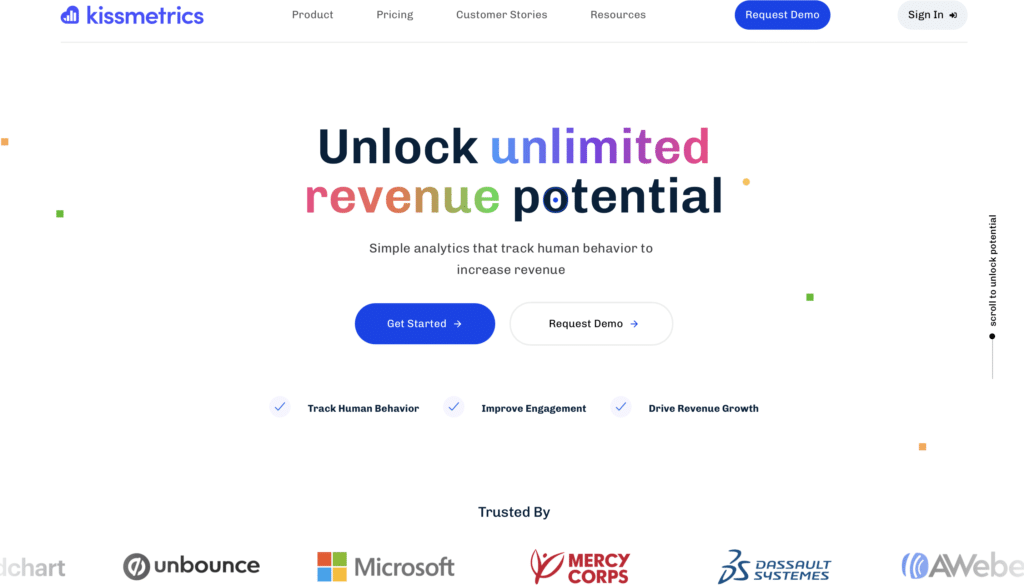
Kissmetrics is another of the best eCommerce analytics tools focusing on customer behavior and conversion throughout the lifecycle. It provides detailed insights into how individuals interact with a site over time, capturing data across multiple visits and devices.
Kissmetrics also has a particularly valuable funnel analysis feature. It clearly visualizes the customer journey and pinpoints stages where users drop off, helping to optimize the conversion process.
Many other tools, like A/B testing and retention analysis tools, help businesses understand what keeps customers returning. These tools directly measure return on investment using data from user actions and marketing campaigns.
Mixpanel
Mixpanel is another unique and advanced analytics platform that provides deep insights into user behaviors through event tracking. Unlike traditional analytics focusing mainly on page views, Mixpanel tracks specific user actions, such as adding items to carts or completing payments, offering a view of the customer journey.
This event-based tracking helps identify potential friction points within the shopping process, enabling businesses to optimize these areas to improve overall conversion rates. Mixpanel also supports real-time data analysis, crucial for immediate decision-making, especially during critical sales.
Mixpanel is one of the best e-commerce analytics tools with a comprehensive toolset to improve customer engagement, optimize conversion paths, and enhance the overall effectiveness of digital marketing strategies.
Heap
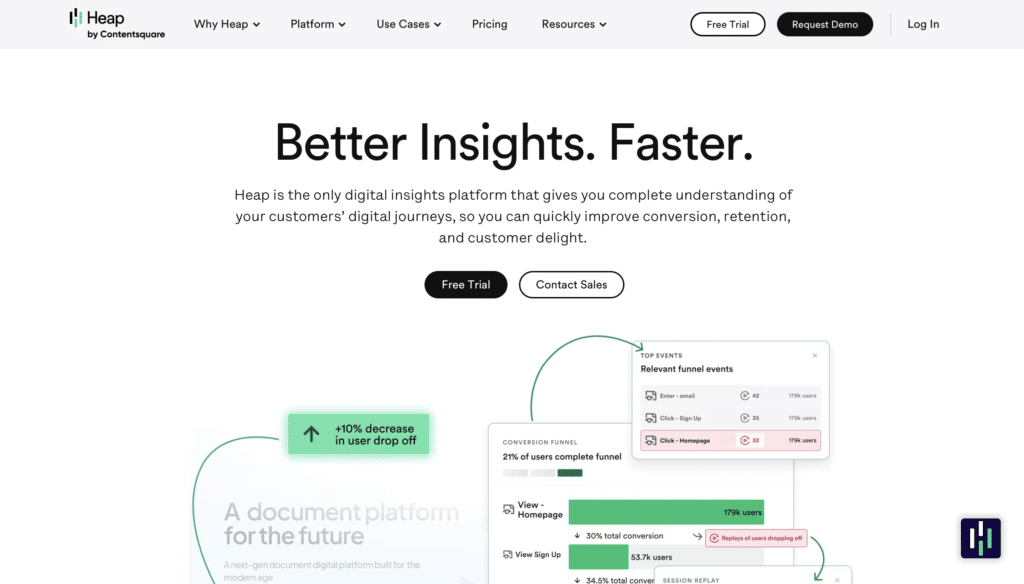
Heap is another unique tool that automatically captures every user interaction on their websites and apps. This comprehensive data capture ensures businesses can access a full dataset from the outset, allowing them to analyze the entire customer journey without any gaps.
Heap’s ability to provide analytics is particularly valuable. It enables businesses to assess past user behaviors without setting up prior event tracking. The platform offers deep insights into user behaviors, from product exploration to checkout. These insights are critical for identifying optimization opportunities, improving site navigation, enhancing product placements, or streamlining checkout to boost conversions.
Hotjar
While not a traditional analytics tool, Hotjar provides visual insights into user behavior through heatmaps and session recordings. This can be incredibly useful for e-commerce sites looking to understand how users interact with their pages and where they might drop off.
Hotjar is also able to analyze conversion funnels, which helps e-commerce sites identify where customers drop off before completing a purchase. This allows for targeted improvements in the checkout process or page layouts.
Hotjar is one of the best e-commerce analytics tools for boosting customer satisfaction.
Best e-commerce Automation Tools
Automation tools are crucial if you are managing large operations. You can automate many operations, such as order processing and inventory management, ensuring accurate stock levels and efficient order fulfillment.
Automation tools allow you to customize targeted marketing and customer relationship management campaigns, improving engagement and conversion rates.
From data analysis to reporting, offering real-time insights to payment processing, you can automate almost any business operation. By reducing the need for manual tasks, automation tools allow e-commerce businesses to focus on growth and strategic planning, thereby increasing overall productivity and competitiveness in the market.
Here are some of the best e-commerce automation tools designed to help you manage inventory, fulfill orders, market your products, and enhance customer service:
Shopify Flow
Exclusive to Shopify Plus users, this tool automates tasks within the Shopify environment, such as inventory management, order processing, and customer engagement. It allows users to create custom workflows that trigger actions based on specified conditions.
For example, Shopify Flow can automatically reorder products when inventory is low, tag high-value customers for exclusive offers, or send personalized thank-you emails after a purchase, all without manual intervention.
This automation saves time reduces the likelihood of errors, and improves customer experiences by ensuring timely and relevant interactions.
Zapier
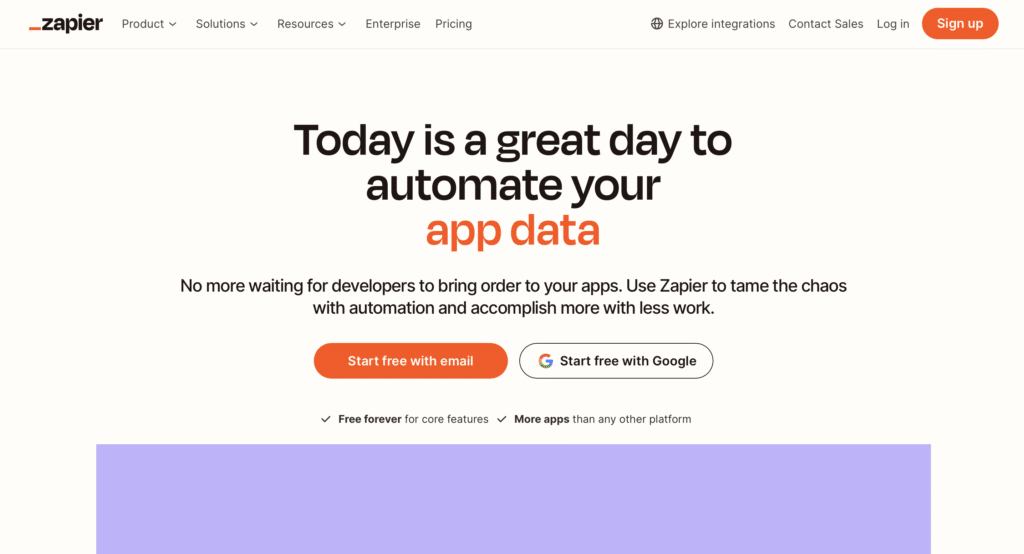
Zapier is a popular and powerful automation tool that serves e-commerce businesses by seamlessly connecting disparate web applications to streamline workflows and automate tasks.
By creating “Zaps,” which are automated workflows, Zapier enables e-commerce platforms to interact with over 3,000 other applications, including CRM systems, email marketing services, and inventory management tools. This connectivity allows for the automation of repetitive tasks such as order processing, where a new order can trigger actions like adding customer details to a CRM, sending personalized email confirmations, and updating inventory levels.
Zapier is a great tool for significantly reducing the manual effort required to manage an e-commerce operation. This allows businesses to focus more on strategic growth.
Omnisend
Omnisend is a marketing automation platform tailored for e-commerce businesses. It enhances marketing strategies by integrating multiple communication channels, such as email, SMS, push notifications, and social media, into a cohesive campaign management system.
This platform simplifies the creation and execution of complex marketing workflows, such as cart abandonment sequences and post-purchase follow-ups, by automating personalized messages triggered by specific customer behaviors.
Omnisend’s strength lies in its ability to segment and personalize marketing efforts based on detailed customer data, including shopping behavior and purchase history, which increases the relevance and effectiveness of campaigns.
Omnisend also seamlessly integrates with major e-commerce platforms like Shopify, BigCommerce, and Magento, facilitating automatically synchronizing customer and product data.
Omnisend is one of the best e-commerce automation tools for improving engagement, boosting sales, and maximizing marketing ROI.
Mailchimp
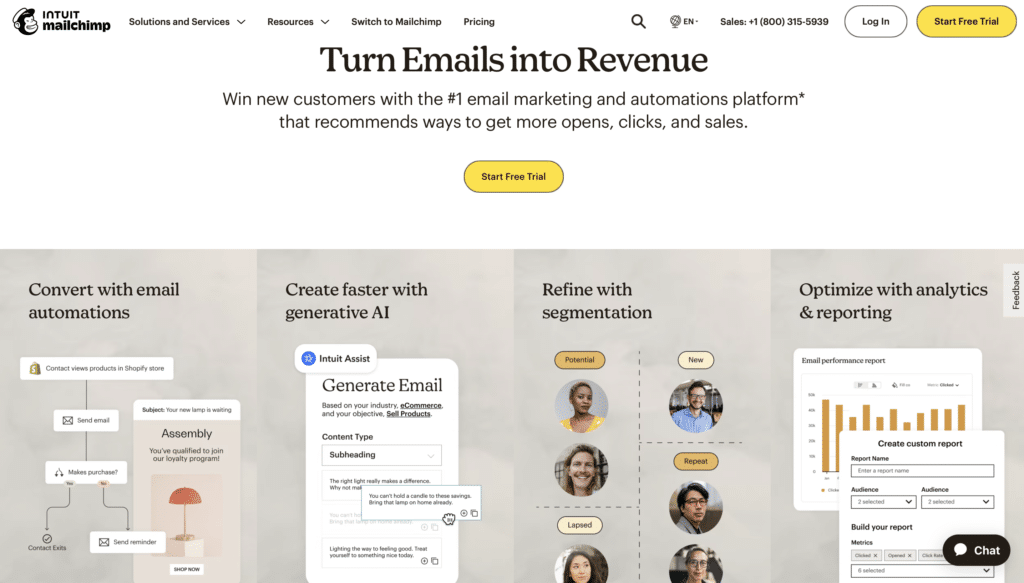
Mailchimp is an email automation tool for targeted campaigns and multichannel marketing. It allows e-commerce businesses to automate email sequences triggered by specific customer behaviors, such as welcome emails for new subscribers or follow-up messages post-purchase. Based on purchase history, behavior, and demographics, segmentation allows for deep personalization and highly effective campaigns tailored to different customer groups.
A standout feature for e-commerce is Mailchimp’s abandoned cart recovery. This feature automatically sends reminders to customers who have left items in their cart, aiding in reclaiming potential lost sales.
Mailchimp also integrates seamlessly with popular e-commerce platforms like Shopify and WooCommerce, syncing customer and order data to streamline marketing efforts across platforms.
Mailchimp equips e-commerce businesses with the necessary tools to automate marketing processes, personalize customer interactions, and manage campaigns across multiple channels, ultimately driving increased engagement and sales.
BigCommerce Automation
This tool improves operational efficiency directly within the BigCommerce platform. You can automate crucial but time-consuming tasks such as updating order statuses, notifying customers about shipping, and managing inventory levels. By automating these processes, BigCommerce helps reduce staff workload, minimize errors, and ensure smoother operations.
BigCommerce Automation also allows customers to be segmented based on various criteria and send targeted emails and promotional offers. This capability personalizes the customer experience and boosts the effectiveness of marketing campaigns. Custom workflows can be created to handle different processes, such as prioritizing orders from high-value customers or automating return approvals based on specific criteria, further streamlining operations.
BigCommerce Automation is an invaluable asset for any e-commerce operation looking to scale efficiently.
All these tools allow businesses to focus more on strategic growth rather than getting bogged down by day-to-day tasks. As e-commerce continues to grow and evolve, the effective integration of these tools will be critical for businesses aiming to stay competitive in the global digital marketplace.
If you’re ready to embark on your e-commerce marketing journey, ContentGo AI is here to assist you with fast, scalable, and high-quality content creation.
Sign up today and elevate your sales.
